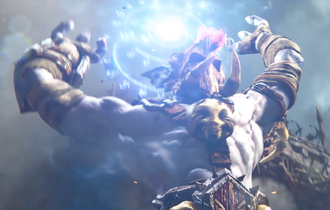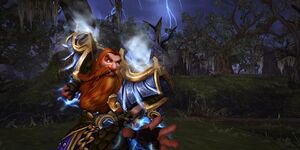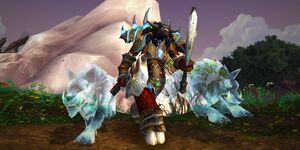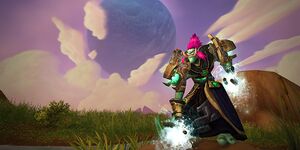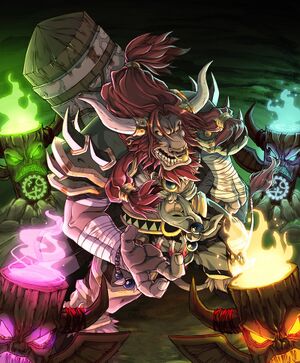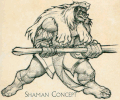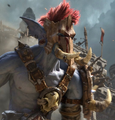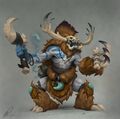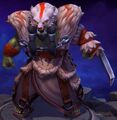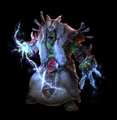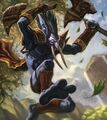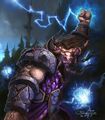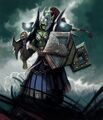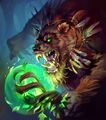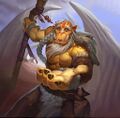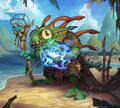Shaman
- For the manga, see Shaman (manga).
Shaman | |
|---|---|
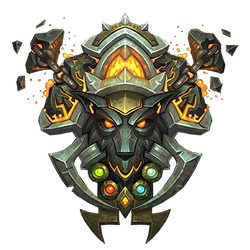 | |
| Available to |
|
| Specializations |
|
| Resource(s) | Mana, Maelstrom |
| Primary attribute | Agility, Intellect |
| Weapon skills | Daggers, Fist Weapons, One-handed and Two-handed Maces, Axes and Staves |
| Armor type | Mail; can also equip Leather, Cloth. |
| Signature abilities |
|
“Know this: a shaman must never demand power; to do so would arouse the anger of the elements, and a shaman without the elements' protection is nothing. Those that follow the path of the shaman must never forget this most vital tenet. However, a shaman that works in a respectful union with the elements wields a power rivaled by few.”
Shaman (sometimes pluralized as shamans)[2] are mortal mediators between the very elements themselves. The shaman is a hybrid class, able to specialize in offensive spellcasting, melee damage dealing, or healing. As such, the class is considered highly adaptable and versatile, as shaman are formidable opponents, able to respond to any situation with a range of unique abilities. Often spiritual guides of their communities, these powerful practitioners commune with the ancestors and seek to balance the raging elemental forces. Shaman become deadly warriors, unstoppable spellcasters, and quick-witted healers by working respectfully with the elements.[3]
During combat, shaman place damaging and controlling totems on the ground to maximize their effectiveness while hindering their enemies. They are versatile enough to battle foes up close or at range, but wise shaman choose their avenue of attack based on their enemies' strengths and weaknesses. By calling on their spiritual power, shaman can restore health to injured allies. They enhance their weapons with elemental effects, empowering their blows with the power of fire, wind, or ice. The elemental force of the shaman can be used to damage enemies from afar with lightning strikes, earthquakes, and lava bursts. They can choose to deploy a wide array of different totems, each with unique effects from improved restoration to greater damage, enhanced crowd control, and more.[4]
Shaman talents can strengthen their ability to heal the wounded, empower their melee attacks with natural force, or call upon blistering elemental spells:
- Elemental shaman are spellcasters who harness the destructive forces of nature and the elements.[4]
- Enhancement shaman are totemic warriors who strike foes with weapons imbued with elemental power.[4]
- Restoration shaman are healers who call upon ancestral spirits and the cleansing power of water to mend allies' wounds.[4]
Class overview
For millennia, since the primitive tribal cultures of Azeroth and Draenor, the natural elements of the physical universe have been celebrated, feared, and even worshiped. Mystics sought communion with the earth, air, fire, and water, and learned to tap into their raw power. In time, these spiritual guides came to understand that nature's elemental forces aren't wholly benevolent, but have, in fact, been locked in an unending conflict of chaos and primal fury that once consumed the physical realm. So began the calling of the Shaman, to bring balance to these volatile energies, leveraging their intensity to mend wounds . . . or inflict them.[5]
Game guide
Shaman are spiritual guides and practitioners, not of the divine, but of the very elements. Unlike some other mystics, shaman commune with forces that are not strictly benevolent. The elements are chaotic, and left to their own devices, they rage against one another in unending primal fury. It is the call of the shaman to bring balance to this chaos. Acting as moderators among earth, fire, water, and air, shaman summon totems that focus the elements to support the shaman's allies or punish those who threaten them.
These masters of the elements can also call upon elemental forces directly, unleashing torrents of lava and bolts of lightning against foes. The elements can create, destroy, support, and hinder. The experienced shaman balances the vast spectrum of these primordial forces into an array of diverse abilities, making shaman versatile heroes and valued members of any group.[4]
Creation screen description
Shaman commune directly with the elements. Their combination of wisdom and resilience makes them ideal as tribal advisors and leaders. In battle the shaman uses totems and spells to manipulate the elements and provoke other fighters into untold heights of rage and might. Shamans exemplify the primal bond between the savage races and their environment.[6]
- Shaman use the power of the elements to enhance their weapon damage or spells. Shaman summon totems in combat, small objects that disable enemies, heal, or cause damage to enemies.
Classic guide
Limited to the Horde, Shamans commune with the chaotic elements, harnessing primal fury to enhance weapons, empower totems, and augment their own abilities.[7]
Background
- Main article: Shaman races
Shamanism has existed since the sapient races first discovered the power of the elements of Earth, Air, Fire, and Water.[8] On Draenor, now shattered Outland, the orcs were shamanistic; on Azeroth, tauren were shamanistic, while the trolls had a history of shamanistic worship of the loa, or spirits.[9] Before being accustomed to the divine Holy Light or the potency of the arcane, the human had primitive belief systems that incorporated simple nature magic, practicing crude forms of druidism and shamanism.[10]
230 years prior to the opening of the Dark Portal, the Earthen Ring was founded by tauren to lead their people with wisdom and maintain the harmony between the elemental spirits.[11]
Though shamanism on Azeroth flourished and still continues to, shamanism on Draenor was all but extinct by the time of the great crossing of the Horde into Azeroth via the Dark Portal. The greatest and yet some of the most vilified orcs were once shaman; such as Zuluhed the Whacked and Ner'zhul. However, Kil'jaeden, archdemon of the Burning Legion, distorted the shaman's connection with their spirits in the sacred mountain of Oshu'gun, himself taking on the form of the shaman's ancestors to convince the shaman (who held much political sway in the orcish culture) that the draenei were the enemy. The ensuing massacres upon several draenei hunting parties offended the spirits, who eventually denied the shaman their powers. Prior to this, the orcs could easily overpower wandering draenei groups, but the nascent Horde was now vulnerable to their mages and paladins.[12] All was set for the transition. Cut off from their elemental powers, the shaman were offered to turn to the more efficient and masterful powers of the Burning Legion, becoming warlocks. Most of the shaman eagerly accepted, even wise and honorable orcs such as Drek'Thar. As the orcs and Draenor got gradually more corrupted, Kil'jaeden and Gul'dan had a barrier put around Oshu'gun which prevented the ancestral spirits and K'ure from making contact with the outside world.[13] Orcs were also forbidden on Blackhand's orders to ever return to the mountain, to make sure none could realize the deception.[14] This effectively outlawed shamanism and its practice.
Years later, after the destruction of Draenor and its transformation into Outland, the elements slowly recovered from the turmoil and uncertainty of being ravaged along with the land when the portals were opened. For some time, they were lost, confused, and neglected: very much like, they sensed, a kindred spirit in a certain Broken draenei named Nobundo was. Hopeful that he would be receptive to contact with them, they did so once they recovered sufficiently enough to reach out once again, and found that he was. In an experience that was probably not too dissimilar to the first ancient shaman of other races, the elements themselves taught Nobundo the delicate balance of nature and the powers and truth of the Five Elements. Spending years primarily as a student of the elements, Nobundo would become a teacher himself, seeking out his first students among his own people at Telredor in Zangarmarsh and opened a new path for the draenei.[15]
Third War
- Main article: Shaman (Warcraft III)
Shamanism in the orcs remained all but extinct until Thrall, the son of the deceased Durotan and future chieftain of the Frostwolf clan, grabbed hold of the reins of Warchief of the New Horde, ushering in a new generation of shamanism, breaking the crippling lethargy of the captive orcs and outlawing the dark magic of the Burning Legion. At the time of the internment camps, a shaman was a derogatory term for someone who told fantastical and unbelievable stories.[16] Shamanism is now at its peak, though, as the New Horde itself became led by a shaman of great power in the new orcish nation of Durotar.
The Burning Crusade
At the time of the invasion of Outland, a few draenei have started to follow the path of the shaman under the guidance of Farseer Nobundo, although for some draenei, the shamanistic teachings of the Broken were considered as heretical and a blasphemy against the Light.[17][18] Draenei and Broken shaman later integrated the ranks of the Earthen Ring, with the main goal to heal Outland.
Legion
During the third invasion of the Burning Legion, the Earthen Ring shaman helped new elementals to replace Ragnaros in the Firelands and Al'Akir in Skywall: Smolderon and Thunderaan respectively.[19][20] They then managed to convince the four Elemental Lords to band together against the Burning Legion. During the conflict, shaman and elementals worked actively from the Heart of Azeroth to fight the demons off the Broken Isles.
Culture
Shamanism is a deeply spiritual form of elemental magic that involves a connection with both the natural and the elemental spirits. Shaman do not normally enslave elementals, but honor them, asking the elements to heed their call. Consequently, the power of the shaman is borrowed, rather than taken. Shaman are not inherently imbued with magic - they harness the powers of the elements through ceremonial totems.[21] There is a relation to the spiritual magic of shaman and the natural magic of druids, which is why the shaman were able to hear the spirits of Stonetalon Mountains.[22] Shaman said that all things had a life, a power, a spirit. They are deeply involved with the spirits of the elements — earth, air, fire, water, and the Spirit of the Wilds — and claimed they could sense the life force in earth and even seemingly dead stone.[23] This Spirit energy is what gave the shaman their connection to the elements, to others, and to themselves. Members of the Earthen Ring save this Spirit for apprentice's studies till they are ready.[24]
Drek'Thar explained to his apprentice Thrall that shaman have a bond with the things of the natural world, thus they strive always to work in harmony with them, with respect in their heart and the willingness to offer something in return. Unlike warlocks who used the fel through their spells, the shaman call for the powers of the elements and work with those who respond, knowing they are borrowed only, never bought. This is their primary agreement, and if they violate it, nothing of nature would ever respond to them again. They request only the barest needs for themselves and their people, and at times, may ask great things, but only when the cause is good and just. In the end, the elements are powerful entities who come of their own free will, and who are companions in their magic, not slaves.[25]
Farseers are exceptionally powerful and wise shaman that play the role of advisors or take on leadership positions in their communities. They are highly esteemed and respected by their factions.
Unlike the others, goblin shaman follow the motto of "Controlling the Elements for Fun and Profit".[26][27] They are an extension of their society's single-minded devotion to making profit; to a goblin shaman, elementals are potential customers with whom they can negotiate and enter contracts.[28] They tend to be a bit more forceful in their negotiations than the other shamanic races would like, though not as forceful as the taunka.[28] Some goblin shaman mechanically modify both their totems[29] and their elemental minions.[30] To shaman of other races, these methods can seem unorthodox[31] or outrageously disrespectful to the elements.[32]
The dark shaman is a dark version of a shaman, forcing the elements into servitude by using Decay,[33][34] twisting them into burned-out ash, corrupted waters, and toxic air. They also use the Void to enslave the elements.[35]
Geomancers practice a crude form of shamanism known as geomancy,[36] which is an earth elemental practice native of several races on Azeroth and Draenor.
Notable
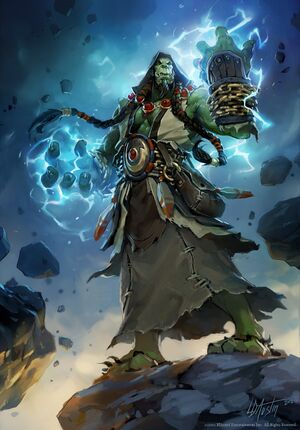
- See also: List of shaman
| Name | Role | Affiliation | Status |
|---|---|---|---|
| Representative of the orcs on the Horde Council and shaman of the Earthen Ring. | Frostwolf clan, Earthen Ring, Horde | Alive | |
| Chieftain and elder shaman of the Frostwolf clan, Seer of the Earthen Ring. | Frostwolf clan, Earthen Ring, Horde | Alive | |
| Former Warchief of the Horde, chieftain of the Darkspear, and leader of Atal-Mhuto. | Darkspear tribe, Atal-Mhuto, Horde | Deceased | |
| Elder Crone of the Grimtotem tribe and Champion of the Earthen Ring. | Grimtotem tribe, Earthen Ring | Alive | |
| Elder shaman of the Shadowmoon clan and Warchief of the Horde of Draenor. | Burning Legion, Shadowmoon clan, Horde of Draenor | Deceased | |
| First draenei shaman, emissary of the elemental spirits, and Champion of the Earthen Ring. | Exodar, Earthen Ring, Alliance | Alive | |
| Champion and former leader of the Earthen Ring. | Earthen Ring, Thunder Bluff | Alive | |
| Champion of the Earthen Ring. Formerly advisor to Thrall and gladiator master. | Earthen Ring, Horde | Alive | |
| Spiritual leader of the Mag'har in Outland. | The Mag'har, Frostwolf clan | Alive | |
| Former chieftain of the Dragonmaw clan. | Dragonmaw clan, Illidari | Deceased |
Shaman organizations
 Earthen Ring, a faction of shaman from all races dedicated to preserving the balance between the elements.
Earthen Ring, a faction of shaman from all races dedicated to preserving the balance between the elements. Guardians of the Vault, a faction of orc shaman in Tanaan Jungle.
Guardians of the Vault, a faction of orc shaman in Tanaan Jungle. Dark Shaman, once a group of dark shaman orcs beneath Orgrimmar.
Dark Shaman, once a group of dark shaman orcs beneath Orgrimmar.
Races
- Main article: Shaman races
The shaman class can be played by the following races:
| Strength | Agility | Stamina | Intellect | Spirit | Armor | Health | Mana | |||
|---|---|---|---|---|---|---|---|---|---|---|
| 22 | 17 | 21 | 21 | 24 | 34 | 59 | 90 | |||
| 22 | 16 | 23 | 22 | 21 | 90 | 69 | 75 | |||
| N/A | ||||||||||
| N/A | ||||||||||
| 21 | 18 | 22 | 20 | 24 | 37 | 123 | 40 | |||
| 18 | 22 | 21 | 24 | 20 | N/A | |||||
| 24 | 17 | 22 | 18 | 24 | 34 | 69 | 73 | |||
| 26 | 16 | 22 | 17 | 24 | 32 | 70 | 72 | |||
| 22 | 22 | 21 | 17 | 23 | 44 | 59 | 72 | |||
| N/A | ||||||||||
| N/A | ||||||||||
| N/A | ||||||||||
| N/A | ||||||||||
Specializations
- "Enhancement" redirects here. For items used to enhance equipment, see Enhancements.
- For a list of specialization-specific abilities, see Shaman abilities#Specializations.
Elemental
A spellcaster who harnesses the destructive forces of nature and the elements.
Elemental shaman are powerful spellcasters, fulfilling a caster DPS role to blast and scorch enemies from afar. They benefit from numerous improvements to their offensive spell casting abilities, boasting reduced cooldowns and mana costs, and increased crit chance, range and damage dealt for many of their spells. Dedicated casters, Elemental shaman' play is augmented with a number of mechanics rewarding spell-casting, including ![]() [Elemental Focus] and
[Elemental Focus] and ![]() [Lava Surge] They also gain some unique abilities of their own, including the iconic
[Lava Surge] They also gain some unique abilities of their own, including the iconic ![]() [Thunderstorm] - a powerful knockback ability notorious for propelling enemies from high edges in PvP - and their
[Thunderstorm] - a powerful knockback ability notorious for propelling enemies from high edges in PvP - and their ![]() [Mastery: Elemental Overload]. Elemental is the choice for shaman who want to play a ranged damage-dealer and maximize their damage output with their spells.
[Mastery: Elemental Overload]. Elemental is the choice for shaman who want to play a ranged damage-dealer and maximize their damage output with their spells.
![]() [Earthquake] is another Elemental ability which, while broadly similar to
[Earthquake] is another Elemental ability which, while broadly similar to ![]() [Blizzard] and
[Blizzard] and ![]() [Rain of Fire], also has utility in being able to knock down foes caught in its area of effect, making it very versatile in both PvE and PvP settings when used right. Combining their
[Rain of Fire], also has utility in being able to knock down foes caught in its area of effect, making it very versatile in both PvE and PvP settings when used right. Combining their ![]() [Chain Lightning] and
[Chain Lightning] and ![]() [Earthquake], an Elemental shaman can do considerable AoE damage.
[Earthquake], an Elemental shaman can do considerable AoE damage.
The most important attribute for Elemental is intellect, which increases spell power. The second-most important statistic is haste, which increases their casting speed.
Certain shaman have dedicated themselves above all else to forging a deep bond with the elements. They have peered beyond the Elemental Plane, gleaning visions of an ancient past where manifestations of volatile energies once raged unimpeded across primordial Azeroth. Through careful study and dedication, the elemental shaman is able to channel such power into destructive magical surges. Through the body of the shaman flows bolts of lightning, as if from storm, and bursts of fire, as if from molten earth. They manipulate the land itself and summon spirits of earth, fire, and storm to their aid. To battle an elemental shaman is to taunt the very forces of nature.[5]
Enhancement
A totemic warrior who strikes foes with weapons imbued with elemental power.
Enhancement shaman are melee damage dealers, smiting opponents with elementally-empowered weapons. A unique melee spec that derives a large portion of its damage from spells, the playstyle of an Enhancement shaman is very active and hectic. Using the right abilities at the right time, combined with ![]() [Maelstrom Weapon] procs, it's a very engaging spec to play.
[Maelstrom Weapon] procs, it's a very engaging spec to play.
Signature abilities of this spec include ![]() [Dual Wield], giving shaman the ability to
[Dual Wield], giving shaman the ability to ![]() [Dual Wield] one-handed-weapons,
[Dual Wield] one-handed-weapons, ![]() [Windfury], which gives a chance of each of your main hand attack to trigger extra attacks, and
[Windfury], which gives a chance of each of your main hand attack to trigger extra attacks, and ![]() [Stormstrike], which allows the shaman to hit with both weapons at once for a large amount of damage.
[Stormstrike], which allows the shaman to hit with both weapons at once for a large amount of damage.
Enhancement Shamans use Maelstrom (game resource) as their resource instead of mana. They passively generate Maelstrom with each auto attack, and can also actively generate it with ![]() [Rockbiter]. They spend their Maelstrom through their usage of
[Rockbiter]. They spend their Maelstrom through their usage of ![]() [Lava Lash],
[Lava Lash], ![]() [Crash Lightning], and many other skills.
[Crash Lightning], and many other skills.
Finally, ![]() [Feral Spirit] allows enhancement shaman to summon a pair of immensely powerful spirit wolves which add a fair amount to the shaman's DPS while active, as well as generating Maelstrom for each time they attack (and providing some unique utility in breaking snares, sprinting, stunning, and taunting enemies).
[Feral Spirit] allows enhancement shaman to summon a pair of immensely powerful spirit wolves which add a fair amount to the shaman's DPS while active, as well as generating Maelstrom for each time they attack (and providing some unique utility in breaking snares, sprinting, stunning, and taunting enemies).
Intense communion with fire, earth, air, and water isn't exclusive to the elemental shaman. In many ways, enhancement shaman similarly bond with nature and leverage its power on the battlefield. What distinguishes them in their training—and in their connection with the elements—is their combat methodology. These shaman favor empowering their physical attacks with elemental energies and facing their adversaries up close. They don't shy from the frontlines, wielding magically augmented weapons, potent elemental attacks, and totems that shape the tide of battle.[5]
Restoration
A healer who calls upon ancestral spirits and the cleansing power of water to mend allies' wounds.
Restoration shaman are versatile healers well suited for any situation, with numerous passive abilities reducing the casting time and mana cost of healing spells, while increasing their effectiveness. On top of that, they offer good utility (like mana regeneration using ![]() [Mana Tide Totem]) and strong multi-target healing through
[Mana Tide Totem]) and strong multi-target healing through ![]() [Chain Heal] and
[Chain Heal] and ![]() [Healing Rain]. Signature abilities include
[Healing Rain]. Signature abilities include ![]() [Earth Shield], a long-term buff that triggers a heal whenever the target is damaged, and
[Earth Shield], a long-term buff that triggers a heal whenever the target is damaged, and ![]() [Riptide], an instant cast heal and an HoT.
[Riptide], an instant cast heal and an HoT.
An important mechanic of the restoration shaman is the ![]() [Tidal Waves] buff, granted upon casting a
[Tidal Waves] buff, granted upon casting a ![]() [Riptide] or a
[Riptide] or a ![]() [Chain Heal]. This buff has initially two stacks. A single stack is consumed upon casting a
[Chain Heal]. This buff has initially two stacks. A single stack is consumed upon casting a ![]() [Greater Healing Wave] or a
[Greater Healing Wave] or a ![]() [Healing Surge]. A spent charge makes a
[Healing Surge]. A spent charge makes a ![]() [Greater Healing Wave] much faster to cast or increases the crit chance of a
[Greater Healing Wave] much faster to cast or increases the crit chance of a ![]() [Healing Surge]. This makes careful management of
[Healing Surge]. This makes careful management of ![]() [Riptide],
[Riptide], ![]() [Chain Heal],
[Chain Heal], ![]() [Tidal Waves] and the Healing Wave spells essential for a good Restoration shaman.
[Tidal Waves] and the Healing Wave spells essential for a good Restoration shaman.
Restoration shaman are highly effective in PvP and group PvE, the only drawback being their rather low damage output, which can make solo play more difficult. In return, a Restoration shaman hardly ever dies while questing/soloing.
Restoration shaman should focus on intellect, seeking to maximize their healing output while maintaining enough mana regeneration to last the fight.
Some shaman find a serene affinity for the restorative properties of water. These shaman do not necessarily seek the Light or turn to the divine, yet they feel a profound spiritual connection with the source from which all mortal life took root. So strong is their connection with water that the shaman is able to restore life and heal afflictions. They balance this with a command of the other elements, finding harmony in nature and purifying their allies as a tidal surge washes across a sandy shore.[5]
Hero talent trees
- Farseer
Harness your spiritual magic, improving your spell casting capabilities and empowering you to call upon ancestors to aid you and your allies in combat.[37]
- Stormbringer
- Totemic
Overview
Shaman were originally a Horde-exclusive class available to three races: tauren, orcs, and trolls. The class was designed as the counterpart to the Alliance-exclusive paladin, and they shared many qualities such as a strong focus on buffs, the ability to act as an off-tank, and useful healing spells. However, balancing the two classes against each other to prevent one faction from having a clear advantage became too difficult for developers, restricting the development of both classes. After the release of The Burning Crusade in 2007, the Alliance gained access to the shaman class with the introduction of the alien draenei, while the Horde gained access to paladins through the blood elves. With both factions now capable of fielding shaman and paladins, developers have been able to balance the shaman against the other classes instead of trying to mirror paladins. Later expansions have seen the shaman class become available to new races.
In the past, shaman were often considered a “Jack of all trades, master of none”. This was a result of their ability to perform many abilities outside the normal realm of skills for their primary specialization. It was also a result of the Cataclysm model for the shaman's iconic totems, in which many classes provided more powerful versions of a shaman's totem buffs but no class provided the same amount of variety.
In game, shaman are capable of filling three roles: ranged DPS, melee DPS, and healing. These roles are represented by the Elemental, Enhancement, and Restoration specializations. Originally, Enhancement shaman were designed to be viable off-tanks to counter the abilities of Protection paladins. As the Horde gained access to paladins with The Burning Crusade, and with the addition of the death knight class in Wrath of the Lich King, the need for shaman tanks was eliminated. Though developers pushed the class towards being exclusively damage dealers or healers, some enthusiasts maintained tanking simple encounters using Enhancement shaman. However, with the removal of the defense statistic in patch 4.0.1, it became impossible for shaman tanks to prevent critical strikes, effectively ending their history.
Abilities
Totems
Shaman totems are unique to the shaman, and give them access to unique and powerful abilities. Once a totem is put down, it cannot be moved, so the shaman must have the intended position in mind when using it. Only Restoration has baseline access to totems, one example being ![]() [Healing Tide Totem]. Enhancement and Elemental need to spec into certain totem talents to have access to totems themselves, such as
[Healing Tide Totem]. Enhancement and Elemental need to spec into certain totem talents to have access to totems themselves, such as ![]() [Totem Mastery] for Elemental and Enhancement, or extra totems for Restoration such as
[Totem Mastery] for Elemental and Enhancement, or extra totems for Restoration such as ![]() [Earthen Wall Totem].
[Earthen Wall Totem].
Spells
Shaman spells include direct damage spells, heals, and weapon buffs among others. Their spells are mostly based on the elements.
Shaman also are graced with ![]() [Astral Recall], a spell similar to the
[Astral Recall], a spell similar to the ![]() [Hearthstone], but it can only be used when out of combat, and is on a separate shorter cooldown.
[Hearthstone], but it can only be used when out of combat, and is on a separate shorter cooldown.
Finally, the combination of ![]() [Reincarnation] and
[Reincarnation] and ![]() [Ancestral Spirit] make shaman the only class able to begin wipe recovery without outside help. These abilities make the shaman one of the most powerful support classes in the game.
[Ancestral Spirit] make shaman the only class able to begin wipe recovery without outside help. These abilities make the shaman one of the most powerful support classes in the game.
Equipment
Shaman can wear cloth armor, leather armor, and mail armor, but they should seek to only wear mail armor. Shaman will often compete with Hunters for armor, since both classes use Mail armor. All shaman specifications can equip daggers, staves, fist weapons and shields, as well as one or two-handed axes and maces. In patch 2.0.1, Enhancement shaman gained the ability to dual wield. There are a number of end-game gear sets for shaman which can be found on the Shaman sets page. The Leatherworking profession is capable of crafting many pieces of mail armor that are attractive to both PvE and PvP focused shaman.
Enhancement shaman should dual wield agility weapons. Elemental and Restoration shaman should equip an Intellect main hand weapon and a shield. Caster shaman may also equip non-shield off-hand items or, if the stats are more beneficial, staves. Prior to Mists of Pandaria, shaman equipped a Totem, in their relic slot in lieu of having a ranged weapon. However, with patch 5.0.4 the ranged weapon slot was removed and the relic items were phased out.
Weapons
- Maces (1-handed) (2-handed)
- Staves (2-handed)
- Shields (off-hand)
- Daggers (1-handed)
- Fist Weapons (1-handed)
- Axes (1-handed) (2-handed)
- Cannot use
- Swords (1-handed or 2-handed)
- Polearms
- Warglaives
- Ranged weapons (wands, bows, throwing weapons, crossbows, guns)
End-game expectations
Totems are a major part of the end game and knowing what totems will benefit the shaman's group members best in different situations is all part of the strategy involved in playing a shaman. All shamans have access to powerful spells such as ![]() [Heroism]/
[Heroism]/![]() [Bloodlust], a powerful raid-wide cooldown that considerably increases everyone's haste for a long period of time, and useful utility such as
[Bloodlust], a powerful raid-wide cooldown that considerably increases everyone's haste for a long period of time, and useful utility such as ![]() [Hex] and
[Hex] and ![]() [Purge].
[Purge].
An elemental shaman will be expected to maximize their damage output as a ranged DPS through careful management of their stats such as Intellect and Versatility, and usage of their offensive spells such as ![]() [Lava Burst]. They are able to call upon
[Lava Burst]. They are able to call upon ![]() [Fire Elemental] for extra damage and also
[Fire Elemental] for extra damage and also ![]() [Earth Elemental] if the shaman requires help tanking an enemy mob.
[Earth Elemental] if the shaman requires help tanking an enemy mob.
An enhancement shaman will be expected to maximize their damage as a melee DPS by stacking stats such as Haste, Agility and Critical Strike. They have access to elemental buffs such as ![]() [Flametongue] to increase their damage output and powerful abilities like
[Flametongue] to increase their damage output and powerful abilities like ![]() [Stormstrike] to devastate all enemies within melee range.
[Stormstrike] to devastate all enemies within melee range.
A restoration shaman will be expected to maximize their healing, and much like an elemental shaman requires Intellect and Critical Strike. They also have access to a vast array of totems to aid their healing, from the minor ![]() [Healing Stream Totem], to the powerful raid-wide healing of the
[Healing Stream Totem], to the powerful raid-wide healing of the ![]() [Healing Tide Totem], to the potentially raid saving
[Healing Tide Totem], to the potentially raid saving ![]() [Spirit Link Totem].
[Spirit Link Totem].
In the RPG
- See also: Battle shaman, Spiritwalker, Spirit champion

Shamans are spiritual visionaries of tribes and clans. These gifted warriors can see into the world of spirits and communicate with creatures invisible to eyes of normal beings. They are beset by visions of the future and use their sight to guide their people through troubled times. Although the shaman may seem wise and serene at first glance, he is a formidable foe; when angered, his wrath is as fierce as those who have a connection to Eternals or nature.[38]
Trivia
- Shaman have a "natural magnetism".[39]
- A knowledgeable shaman can hear the sound of all the world's tongues on the wind.[40]
- The shaman show their allegiance to the elements with the decorative symbols on this The Earthshatterer armor, and it gives them the power to protect the allies even further.[3]
- In Warcraft II the differences between shaman and warlock were not yet well established, as it was stated that shaman could manipulate "the cold, negative-energies of the Twisting Nether".[41] In the canceled Warcraft Adventures, Thrall had to learn some of the dark magics of the death knights in order to become shaman, referring to the older background about the ancestral religion of the orcs being necromantic instead of elemental.[42]
- During the early beta days of World of Warcraft, shaman could only wear bucklers instead of any shields.
Gallery
Shaman concept in The Art of World of Warcraft.
Shaman Zekhan in the Battle for Azeroth trailer.
Drust shaman concept art.
Pygmy shaman concept.
Shaman Adept Rehgar in Heroes of the Storm.
World Shaman Thrall in Heroes of the Storm.
Shaman from Warcraft III.
Spirit walker concept art.
Shaman in Warcraft III: Reforged.
Art with a orc shaman fighting Alliance troops.
Orc Shaman from the Reign of Fire TCG set.
Barador, Wildhammer Timewalker, a dwarf shaman.
Domona, a draenei shaman.
Gladiator Sepirion, a troll shaman.
Grennan Stormspeaker, a tauren shaman.
Haruka Skycaller, an orc shaman.
Kinivus the Focused, a draenei shaman.
Kylanda the Harmonious, a draenei shaman.
Memri the Channeler, a draenei shaman.
Mojo Doctor Zin'tar, a troll shaman.
Mojo Shaper Ojo'mon, a troll shaman.
Najan Spiritbinder, an orc shaman.
Orono the Great, a draenei shaman.
Phadalus the Enlightened, a draenei shaman.
Rimblat Earthshatter, a tauren shaman.
Spiritwalker Kavi'je, a troll shaman.
Statia the Preserver, a draenei shaman.
Tribemother Torra, a tauren shaman.
Videos
- Official Crash Course: Level 90 Shaman (Elemental)
- TGN - Elemental Shaman DPS! (Cataclysm)
- TGN - Enhancement Shaman DPS! (Cataclysm)
Patch changes
 Patch 10.2.0 (2023-11-07): Enhancement Starter Build has been updated.
Patch 10.2.0 (2023-11-07): Enhancement Starter Build has been updated.  Patch 7.0.3 (2016-07-19): Now begins with mail armor at level 1 instead of leather armor.
Patch 7.0.3 (2016-07-19): Now begins with mail armor at level 1 instead of leather armor.  Patch 5.1.0 (2012-11-27): All totems are now considered spells, and summoning totems can be prevented by silencing effects.
Patch 5.1.0 (2012-11-27): All totems are now considered spells, and summoning totems can be prevented by silencing effects.  Patch 5.0.4 (2012-08-28):
Patch 5.0.4 (2012-08-28):
- Relics have been removed from the game.
- Totems no longer provide long-term buffs. Some of the old passive effects are now innately provided by the shaman. Totems instead have short-term situational benefits.
 Patch 4.0.1 (2010-10-12): Totems are no longer necessary to keep in your bags. Many totem quests have been removed.
Patch 4.0.1 (2010-10-12): Totems are no longer necessary to keep in your bags. Many totem quests have been removed.  Patch 3.2.0 (2009-08-04):
Patch 3.2.0 (2009-08-04):
- A customizable Totem Bar will now be available for shaman allowing the storing of 4 different totems. These totems can be placed on the ground at once in one global cooldown for the combined mana cost of all 4 totems.
- Base health increased by approximately 7% to correct for shamans having lower health than other classes.
 Patch 3.0.2 (2008-10-14): All totems are now considered in the "Physical" school, and no longer magical spells.
Patch 3.0.2 (2008-10-14): All totems are now considered in the "Physical" school, and no longer magical spells.  Patch 2.0.1 (2006-12-05):
Patch 2.0.1 (2006-12-05):
- With the introduction of the draenei, shamans are now playable by both the Alliance and the Horde.
- Shaman with the appropriate talent spec are now able to dual-wield.
See also
- A list of useful macros for shamans.
References
- ^
 [Empowered Rune]
[Empowered Rune]
- ^ Warcraft III: Reign of Chaos Game Manual
- ^ a b Exploring Azeroth: Northrend, pg. 97
- ^ a b c d e https://worldofwarcraft.blizzard.com/en-us/game/classes/shaman
- ^ a b c d Legion Class Preview Series: Shaman
- ^ World of Warcraft: Classic class description
- ^ Taking Your First Steps in World of Warcraft Classic
- ^ World of Warcraft: Chronicle Volume 1, pg. 90
- ^ Ultimate Visual Guide, pg. 140
- ^ World of Warcraft: Chronicle Volume 1, pg. 126
- ^ Shaman, prologue
- ^ Rise of the Horde, chapter 12
- ^ Rise of the Horde, chapter 17
- ^ Rise of the Horde, chapter 18
- ^ Unbroken
- ^ Lord of the Clans, pg 98
- ^ Draenei Artificer#Quotes
- ^ Farseer Nobundo#The Exodar
- ^

 [45] The Firelord's Command
[45] The Firelord's Command
- ^

 [45] Gathering of the Storms
[45] Gathering of the Storms
- ^ Ultimate Visual Guide, pg. 21
- ^
 [23] Shredding Machines
[23] Shredding Machines
- ^ Rise of the Horde, pg. 55
- ^ Shaman, pg. 40
- ^ Lord of the Clans, chapter 12
- ^ Maxx Avalanche#Quotes
- ^ Environmental Engineer Linza#Quotes
- ^ a b Ask CDev Answers - Round 1
- ^
 [30-35] Totem Modification
[30-35] Totem Modification
- ^ Modified Earth Elemental
- ^

 [10-45] Tech It Up A Notch
[10-45] Tech It Up A Notch
- ^
 [30-35] Back in One Piece
[30-35] Back in One Piece
- ^ World of Warcraft: Chronicle Volume 1, pg. 10
- ^ Dave Kosak on Twitter: "Shaman use the four elements and "spirit" to bring them to life. Only dark shaman forego spirit and use the elements with decay."
- ^
 [35-40] Disrupt the Rituals
[35-40] Disrupt the Rituals
- ^ The Old Wizard's Almanac
- ^ Get an Eye on an Even Dozen New Hero Talent Trees
- ^ World of Warcraft: The Roleplaying Game, pg 71
- ^

 [10-45] Clutch Play
[10-45] Clutch Play
- ^
 [25-30] Speaking with the Wind's Voice
[25-30] Speaking with the Wind's Voice
- ^ Warcraft II: Tides of Darkness manual, The History of Orcish Ascension, The Rise of the Shadow Council
- ^ Warcraft: Orcs & Humans manual, Orcish Horde of the First War, Necrolyte
External links
| ||||||||


